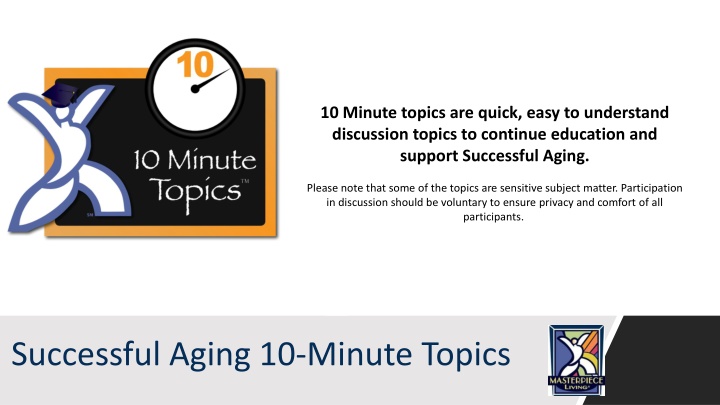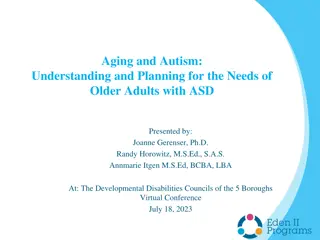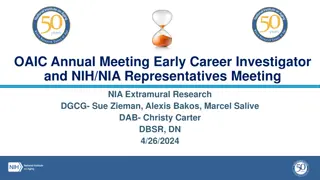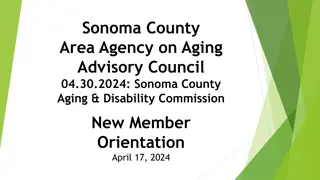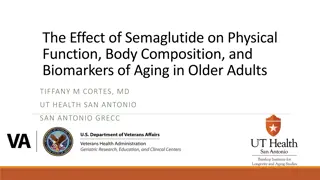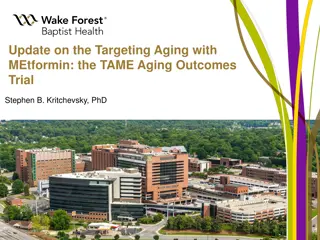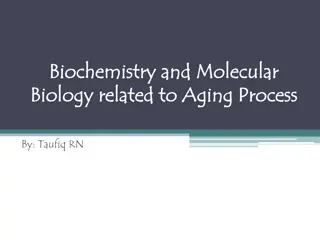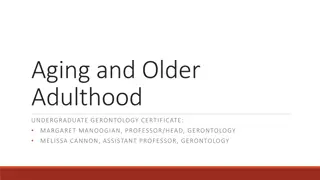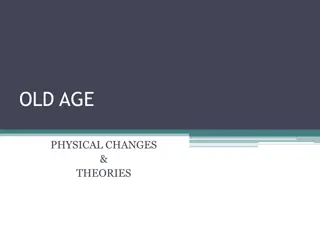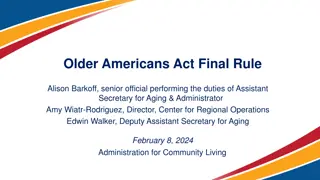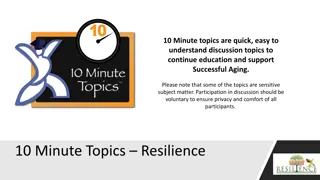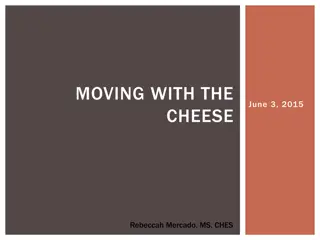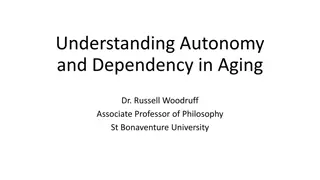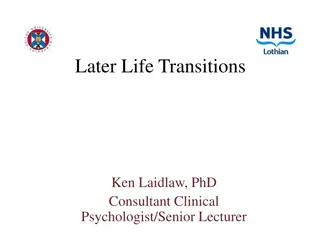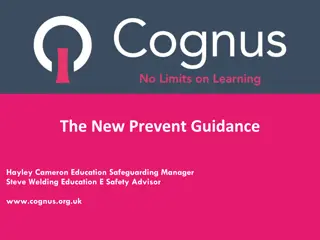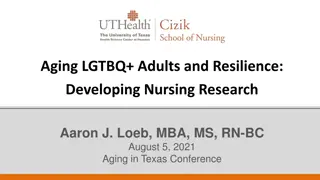Insights on Successful Aging: Engage, Function, Prevent
Delve into the essentials of successful aging, tackling themes of social engagement, cognitive and physical function, disease prevention, and disability management. Explore strategies for maintaining a fulfilling social network, preserving brain and body health, and mitigating disease risks to age gracefully and purposefully.
Download Presentation

Please find below an Image/Link to download the presentation.
The content on the website is provided AS IS for your information and personal use only. It may not be sold, licensed, or shared on other websites without obtaining consent from the author.If you encounter any issues during the download, it is possible that the publisher has removed the file from their server.
You are allowed to download the files provided on this website for personal or commercial use, subject to the condition that they are used lawfully. All files are the property of their respective owners.
The content on the website is provided AS IS for your information and personal use only. It may not be sold, licensed, or shared on other websites without obtaining consent from the author.
E N D
Presentation Transcript
10 Minute topics are quick, easy to understand discussion topics to continue education and support Successful Aging. Please note that some of the topics are sensitive subject matter. Participation in discussion should be voluntary to ensure privacy and comfort of all participants. Successful Aging 10-Minute Topics
Successful Aging Basics #1 What does successful aging mean? It means three things: First, being actively engaged with life. Second, keeping the brain and body functioning at high levels, and third, having a low risk of disease and disability related to disease. Today let s talk about the first being actively engaged with life and we will focus on the other areas in the coming days. Continued engagement with life means to have a network of friends as well as having meaning and purpose in your life. As people age, friends can be lost. Yet being a part of a social network of friends and family is one of the best predictors of a long life. Once older adults retire, they can easily lose their sense of meaning and purpose in life. So it is easy to see that these areas need attention throughout life, but especially for older adults. __________________________________________________ Discussion Questions: Has the number of friends in your life increased or decreased? Would you say that older adults in your life have more or less friends in their lives now? What would you say is your meaning and purpose in life? What do you think it might be when you are older? Have you ever asked an older adult about their purpose in life now that they ve reached older adulthood?
Successful Aging Basics #2 We have talked about successful aging and what that means. So far, we focused on the first area- being actively engaged with life. Today we will cover the second keeping the brain and body functioning at high levels. Older people, like younger people, want to be as independent as they can be. They do not want to depend on another person for daily needs like taking care of oneself. People stay independent by keeping the body and brain functioning at the highest possible levels. And the good news is that much functional loss can be prevented and many functional losses can be regained. __________________________________________________ Discussion Questions: How might we support older adults in preventing functional losses (both brain and body) How might we help older adults regain function? What steps do you take to keep your brain and body functioning well? What would you like to improve in this area?
Successful Aging Basics #3 We ve been talking about successful aging and its meaning. We have discussed the first two areas so far: being actively engaged with life and keeping the brain and body functioning at high levels. Today we will talk about the third and final area: having a low risk of disease and disease-related disability. Avoiding disease and disability is a good goal! There are many things we can do that are within our control that can help us avoid disease and disability. The body gives us warning signs that we can be aware of. These include increases in blood pressure, abdominal fat and blood sugar, and loss of bone density and muscle mass. Some of these warning signs are invisible though, so it is important to see your doctor. And remember that these warning signs can be reversed. Can you age successfully if you already have disease or disability? Yes! Aging successfully means managing this as best you can and knowing that you can still live a good, productive life. Just think about Stephen Hawking, who is the greatest living physicist, yet severely disabled by Lou Gehrig s disease. His body is in a wheelchair but his mind, as he says, is free to explore the limits of the universe. ________________________________________________ Discussion Questions: Do you know people who have taken their health very seriously and done all they can to reduce their risk of disease and disability? Do you know people who have not? How might you encourage someone to be aware of the warning signs? How might you encourage someone to age successfully even though they are living with disease and/or disability?
Successful Aging Basics #4 As a group we have talked about successful aging and how it is defined being actively engaged with life, keeping the brain and body functioning at high levels and having a low risk of disease and disability. Research shows that people who work toward these 3 areas live healthier lives and, rather than slowly declining over a long period of time, they have very short times of sickness at the end of their life. They live long and die short. ________________________________________________ Discussion Questions: Can you think of someone who takes part in all three areas? -What does their lifestyle look like? What about for you? What area are you strongest in? What category can you improve on? How can we promote these three areas in our organization? Among our friends and family?
Successful Aging Basics #5 The successful aging curve shows usual aging (the solid line) and successful aging (the dotted line). Because of stereotypes and common beliefs, many people have accepted the fact that they would slowly decline when they got older. But research shows that it s possible to maintain your health and function as you age, even late in life! ________________________________________________ Discussion Questions: What are you currently doing to stay on the high road to aging? What could you improve on now that would prevent the decline of the usual aging curve? How can we support others in taking the successful aging path?
Dr. Rogers Ten Tips, Tip #1 In his book, Live Long Die Short, Dr. Roger Landry offers ten tips for successful aging. What does successful aging mean? It means three things: First, being actively engaged with life. Second, keeping the brain and body functioning at high levels, and third, having a low risk of disease and disability related to disease. Today, we will begin with tip #1, use it or lose it. We should aim to grow, whether physically, socially, or intellectually. Why? Because growth is good. It means we are more likely to age in a healthy way. __________________________________________________ Discussion Questions: In what ways have you grown in the past few months? What ways does our organization provide ways to grow? In what ways would you like to grow in the future?
Dr. Rogers Ten Tips, Tip #2 In his book, Live Long Die Short, Dr. Roger Landry offers ten tips for successful aging. Today we will cover tip #2, keep moving. New research tells us that sitting too much puts our health at risk in fact as much as smoking. Standing desks and walking meetings are good ways to move more during the day, and there are lots of devices that track the number of steps taken in a day. _________________________________________________ Discussion Questions: How much do you move during your day? How might you move more? In what ways do we encourage our organization to move?
Dr. Rogers Ten Tips, Tip #3 In his book, Live Long Die Short, Dr. Roger Landry offers ten tips for successful aging. Today we will cover tip #3, challenge your brain. Learning new things can lower the risk of dementia. Learning a new language, skill or hobby are good examples of challenging your brain. _________________________________________________ Discussion Questions: What is one way that you have challenged your brain lately? What is something you would like to learn? In what ways does our organization encourage others to learn new things?
Dr. Rogers Ten Tips, Tip #4 In his book, Live Long Die Short, Dr. Roger Landry offers ten tips for successful aging. Today we will cover tip #4, stay connected. Isolation means to be separated from others. Being isolated is not healthy. Isolation raises our risk for many chronic diseases. Loneliness hurts. To age in a healthy way, we must stay connected with others and meet new people. _________________________________________________ Discussion Questions: How do you stay connected with friends? How have you made new friends? In what ways does our organization encourage others to be social?
Dr. Rogers Ten Tips, Tip #5 In his book, Live Long Die Short, Dr. Roger Landry offers ten tips for successful aging. Today we will cover tip #5, lower your risks. This means knowing what you might be at risk for and doing what you can to live a healthy life. _________________________________________________ Discussion Questions: In what ways do you live a healthy life? What would you like to do to become more healthy? In what ways does our organization support others to live a healthy life?
Dr. Rogers Ten Tips, Tip #6 In his book, Live Long Die Short, Dr. Roger Landry offers ten tips for successful aging. Today we will cover tip #6: never act your age. Have you ever heard someone say, at my age, I shouldn t .? And did you ever wonder who makes those rules? To age successfully, a person should not believe such stereotypes. Never let age hold you back. When we expect too little of ourselves, we do not achieve our full potential. _________________________________________________ Discussion Questions: Have you ever been told to act your age? (If so, congratulations) Is there something you would like to do, but you feel you are too old to do it? Have you ever heard someone say, At my age, I shouldn t ..? How did you respond? How might you respond?
Dr. Rogers Ten Tips, Tip #7 In his book, Live Long Die Short, Dr. Roger Landry offers ten tips for successful aging. Today we will cover tip #7, wherever you are . BE there. This means that we should be fully present in each moment. Thinking about the past or worrying about the future can be stressful, and means that we are not fully present in the moment. Take a deep breath and enjoy this moment in time. _________________________________________________ Discussion Questions: What healthy ways do you lower stress? What advice would you give to help others to focus in the present moment? In what ways does our organization offer the chance to de-stress?
Dr. Rogers Ten Tips, Tip #8 In his book, Live Long Die Short, Dr. Roger Landry offers ten tips for successful aging. Today we will cover tip #8, find your purpose. We age in a healthy way when we have found our purpose in life. Those who have meaning and purpose live longer and better. _________________________________________________ Discussion Questions: What is your purpose in life? What tips would you give to someone trying to find their purpose? In what ways do we help those in our organization find their purpose in life?
Dr. Rogers Ten Tips, Tip #9 In his book, Live Long Die Short, Dr. Roger Landry offers ten tips for successful aging. Today we will cover tip #9, have children in your life. If we want to age in a healthy way, we should have contact with different generations, especially children. _________________________________________________ Discussion Questions: Do you have children in your life? When you have contact with children, how do you feel? How have you noticed older adults reaction when they are with children?
Dr. Rogers Ten Tips, Tip #10 In his book, Live Long Die Short, Dr. Roger Landry offers ten tips for successful aging. Today we will cover tip #10, laugh. A positive attitude helps us live longer and healthier. Getting involved in a Complaint Free World campaign, or performing Random Acts of Kindness are great ways to stay positive. _________________________________________________ Discussion Questions: Who is the most positive person you know? How have you been positive in a tough situation? In what ways would you like to be more positive?
Dr. Rogers Ten Tips Summarized Below is a recap of Dr. Roger Landry s Ten Tips for Successful Aging from his book Live Long Die Short. We ve discussed each tip in the previous weeks. 1) Use It Or Lose It whether physical, intellectual, or social skills 2) Keep Moving new research tells us sitting is the new smoking 3) Challenge Your Brain learning new things can reduce likelihood of dementia 4) Stay Connected isolation increases risk of multiple chronic diseases 5) Lower Your Risks includes determining what those risks are 6) Never Act Your Age low expectations are self fulfilling 7) Wherever You Are Be There much stress is self induced and preventable 8) Find Your Purpose without purpose we wither 9) Have Children In Your Life intergenerational contact is essential to healthy aging 10) _________________________________________________ Laugh positive attitude is strongly associated with longer life Discussion Questions: What tip stands out the most to you? Why? Which tip does our organization do well with? With which tip could our organization do better? What ideas do you have?
Perceptions of Aging, #1 Believing that aging is a positive experience can help us to age in a better way. One study* showed that those who view aging more positively lived longer than those who viewed it negatively. ________________________________________________ Discussion Questions: How many more years do you think the positive group lived? (Allow some time for guesses, then give the answer: 7.5 years) Many people think that aging is all about disease and decline. What do you think? What would you say to someone who is very negative about aging? *B.R. Levy, M. D. Slade, S. V. Kasl, and S. R. Kunkel, Longevity increased by positive self-perception of aging. Journal of Personality and Social Psychology 83, 2 (2002), pp. 261-70
Perceptions of Aging, #2 During our life, we come across many positive and negative stereotypes of older adults and the aging process. A stereotype is a belief, but it could be right or wrong. Some stereotypes about aging are about common age-related changes, and these are true. But other stereotypes about aging are not true. If we believe these stereotypes, we will be part of a self-fulfilling prophecy and be less healthy as we age. What we believe can influence how we will age! ________________________________________________ Discussion Questions: What are some true stereotypes about aging? Name some stereotypes that are wrong. Name an older adult whose aging process you admire. *Self-Fulfilling Prophecy How Perceptions of Aging Affect Our Later Years By Jennifer L. Smith, PhD, Senior Research Manager Mather LifeWays Institute on Aging
Perceptions of Aging, #3 One study* found that those who have positive views about aging age better than those who view aging negatively. In other words, if we think that aging is bad, we will, in fact, have a more negative aging experience versus those who view aging as a time of growth and possibility. This study found six ways in which those who view aging positively have better health outcomes. Earlier this week, we discussed the first: longevity. This means those who view aging positively actually live longer 7.5 years longer! Today we will discuss the second, which is less illness. In a study** of 1,286 people (average age of 57 at baseline), those who felt that aging is a time of learning and growth reported less illnesses six years later. Others in the same study who felt that aging is a time of physical loss had more illness over six years. _______________________________________________ Discussion Questions: Do you know people who see aging mainly as a time of learning and growth? Do you know people who see aging mainly as a time of loss? How do you think about aging? How does our organization encourage positive views of aging?
Perceptions of Aging, #4 How we think about aging can tell us how we will likely age. One study* found that those who have positive views about aging, age better than those who view aging negatively. This study found six ways in which those who view aging positively have better health outcomes. So far, we have discussed the first two, living longer and having less illness. Today we will discuss the third, functional health, and the fourth, brain health. Functional health includes the ability to do household chores and climb stairs. At the beginning of one study, none of the participants (age 65 to 70) reported any limitations. You won t be surprised to learn that those with positive views of aging had better functional health. However, older adults with more negative views of aging had more limitations in activities of daily living such as feeding, bathing, shopping and managing finances - just three years later. _______________________________________________ Discussion Questions: In what ways does our organization support maintaining functional health? In what ways might we be limiting others functional health? (facilitator, this question attempts to prompt the team members to mention ways that we might over assist do for others that which they can do for themselves. In doing so, we facilitate decline.)
Perceptions of Aging, #5 How we think about aging can tell us how we will likely age. One study* found that those who have positive views about aging, age better than those who view aging negatively. This study found six ways in which those who view aging positively have better health outcomes. So far, we have discussed the first two, living longer and having less illness. And how about brain health? Compared to people with more positive views of aging, people who had more negative age stereotypes had greater signs of risk factors for Alzheimer s Disease when their brains were examined decades later. _______________________________________________ Discussion Questions: In what ways do we support others in keeping their brains healthy? Have you ever heard the term senior moment? Have you ever used that term? In what ways do you keep learning? What would you like to learn?
Summary of Perceptions of Aging In the past six weeks, we have been discussing how we think about aging and how our thoughts can shape how we will age. We have discussed the six ways in which those who view aging positively have better health outcomes. They include living longer, having less illness, better functional health, brain health, psychological well-being and healthy behaviors. _______________________________________________ Discussion Questions: Which of these stands out the most to you? Why? Have your views about aging changed due to this information? What might you say to someone (a friend, family member, team member or resident) who has negative views about aging? *Self-Fulfilling Prophecy How Perceptions of Aging Affect Our Later Years By Jennifer L. Smith, PhD, Senior Research Manager Mather LifeWays Institute on Aging
Growth at Every Age, #1 Successful aging is all about creating a place where everyone is growing and reaching their full potential. It s a little like a University campus, where every single person is there to grow and learn and be the best they can be. There are many ways that we can grow that will help us age successfully, and we will discuss some of them this week. Today, let s start with keeping our brains sharp, which is an important area of successful aging. Albert Einstein said, I have no special talents. I am only passionately curious. Learning cannot stop when we finish school. If we are life-long learners, we are more likely to live a long and healthy life. Brain experts agree on 5 ways to keep the brain sharp. First, physical activity. Getting the blood pumping is good for the brain. Second, mentally difficult tasks. We must learn new things. Third, stress control. Constant stress raises our risk for dementia. Find what helps you de-stress and make time for it. Fourth, unplugging. Don t be a prisoner of your phone, texts or emails. Unplug and be socially connected the old-fashioned way. Finally, balanced nutrition. One study found that the risk of Alzheimer s Disease is 80 percent greater for people living with obesity.* _________________________________________________ Discussion Questions: How do you keep your brain sharp? What would you like to learn? How do you unplug? In what ways might you like to focus more on brain health?
Growth at Every Age, #2 This week we re talking about growth at every age. Growing our physical function is an important part of aging successfully. The physical component of successful aging includes aerobic activity, strength, balance, flexibility, nutrition, sleep and taking part in preventative health screenings. Being active in these areas may help lower risk for heart disease, stroke, diabetes, cancer, osteoporosis, depression, falls and Alzheimer s disease. Research proves that if we do not grow our physical function, we will decline. _________________________________________________ Discussion Questions: In what ways have you already focused on growing your physical function? How did you accomplish this? In what ways do you think you can improve your physical function? How does our organization support others in growing their physical function? How can we support them even more?
Growth at Every Age, #3 Growth at every age includes growing friendships. Do you have close friends that you could call at 3 a.m. if you needed something? If not, it is time to grow your friendships. Think about who makes you feel better about yourself, who gives you energy. These are the right friends for you. If you would like to grow the number of friends in your life, consider using social networking to find friends who you have lost touch with or to make new friends. Do you enjoy hiking? Bicycling? Writing? Follow your passions to make new friends by joining a club or taking a class. You will be healthier for it! _________________________________________________ Discussion Questions: Has the number of friends in your life increased or decreased over the past few years? How might you make new friends, both at work and outside of work? In what ways might you support those in our organization in making new friendships?
Growth at Every Age, #4 Mary lives in a skilled nursing community, and although she was crafty throughout her life, she had never picked up a paintbrush, until the community s art instructor repeatedly invited Mary to try the painting class. Finally, Mary agreed, discovered a brand-new talent and passion, and has several art shows to date. Any time is a good time to grow skills and find new passions. _________________________________________________ Discussion Questions: What skill have you always wanted to learn? What is one interest or passion that you have? How might you bring your skills and interests to work to share with your organization?
Having Fun in the Workplace, #1 Norman Cousins was a journalist, editor and world-peace activist. When he was told that he had a disease that would cripple him and that had no cure, he was shocked and angry. Then he decided to laugh. He had read in a 1956 book called The Stress of Life about how stress and negative emotions could cause negative chemical changes in the body. Norman Cousins wondered whether positive emotions could cause positive changes in the body. So he rented a move projector Marx brothers movies and episodes of Candid Camera. Right away he noticed that after just 10 minutes of laughing, his pain was better. He kept laughing. And he laughed his way into remission for 30 years, meaning his disease was no longer active. He passed away from heart disease, and his doctors could not explain how this happened. _______________________________________________ Discussion Questions: How often do you laugh at work? At home? When was the last time you laughed so hard that you could barely catch your breath? How did you feel? How might we have more fun in our workplace and everyday lives?
Having Fun in the Workplace, #2 As we age, gravity works on our faces and what we consider a neutral face is actually easily interpreted as angry or sad. Those who appear on television know this and maintain a face that feels like a slight smile in order to look neutral. Take a look in the mirror. Let your face lapse into your default mode, the face you make when you re driving, for example. Now look back into the mirror without changing your expression. This is how the world sees you. Now smile. This is you thinking good thoughts. Now laugh. This is you without stress. Who would you like to be? _______________________________________________ Discussion Questions: Have you ever not approached someone because they had a sad or angry expression? How might we make this work week more fun and filled with laughter?
Having Fun in the Workplace, #3 Results from the Boston University-based New England Centenarian Study show that it is possible to laugh yourself to better health, better aging and even a longer life. Those who live to be a hundred or more seem to be able to handle stress better than others. These are people who have lived a long enough life to have lived through very difficult times, so they are realistic about life s ups and downs. Yet, they believe they will meet whatever lies ahead with the time comes, so they do not worry about it now. Rather than worry through life, they laugh instead. _______________________________________________ Discussion Questions: Have you ever tried laughter yoga? What do you remember being the most fun you ve ever had at work? How often do you hear those in your organization laugh?
Having Fun in the Workplace, #4 Researchers at Loma Linda University have been studying the effects of laughter for over 30 years. They have shown that laughter reduces stress hormones, which are known to decrease immune function. In other words, the more stressed we are, the more likely we are to get sick. These researchers have found that laughter strengthens the immune system, improve mood and increase relaxation. A stronger immune system helps to prevent cancer and infection, as well as many other threats to our good health. _______________________________________________ Discussion Questions: What activities have you been involved in that make you laugh? What brings out the kid in you?
Having Fun in the Workplace, #5 Research from Oxford shows that laughter is helpful for those who have pain. This is because laughter causes endorphins to be released, which give us pain relief and feelings of well-being. In his book, My Spiritual Journey, the Dalai Lama calls himself a professional laugher. Despite the many difficulties he has faced as a Tibetan leader in exile, he chooses to focus on the positive parts of life and laugh easily and often. _______________________________________________ Discussion Questions: In thinking about the past few days, what has made you laugh out loud? When was the last time you laughed until you cried?
Gratitude, defined Gratitude is riches. Complaint is poverty. Doris Day Let us rise up and be thankful, for if we didn't learn a lot today, at least we learned a little, and if we didn't learn a little, at least we didn't get sick, and if we got sick, at least we didn't die; so, let us all be thankful. Buddha Research shows gratitude plays a big role in a person s sense of happiness. Gratitude is a feeling of thankfulness. But it goes beyond just a feeling. Gratitude in action means showing appreciation and returning kindness. Those who practice gratitude report higher levels of alertness, enthusiasm, determination, positivity, energy, and less depression and stress. _________________________________________________ Discussion Questions: What are some ways that you can show more gratitude others in your organization? What aspects of your life are lacking in gratitude? How can we incorporate more gratitude into our organization?
Gratitude in Action, #1 Would you like to feel more positive, more alive? Would you like to sleep better, be more compassionate and kind, and have a stronger immune system? If there were a pill for that, would you want to take it? Well, no pill needed. All of these are within reach they are the result of the simple acts of gratitude. This simply means being thankful and expressing it. How do we hone our ability to practice gratitude? At the end of the day, try making a mental (or actual) list of the things, people, situations or moments that you were grateful for. Be as specific as possible. The more you look, the more you see. Another idea is a gratitude jar. Throughout the year, write on small note paper what you are grateful for. At the end of the year, review everything in the jar. _________________________________________________ Discussion Questions: Name something or someone that you are grateful for today. When was the last time you wrote a thank you note? Received one? How might we express gratitude to those in our organization more regularly? https://my.happify.com/hd/the-science-behind-gratitude/
Gratitude in Action, #2 Research shows that we can have increased well-being and life satisfaction if we have an attitude of gratitude. Gratitude makes us nicer, more trusting, more social, and more appreciative. As a result, it helps us make more friends, deepen our existing relationships, and improve our marriage. _________________________________________________ Discussion Questions: When was the last time someone gave you a compliment? When was the last time you complimented another person? Can you identify an instance in the past week that you missed a potential opportunity to give a compliment? https://my.happify.com/hd/the-science-behind-gratitude/
Gratitude in Action, #3 Research shows that we can have increased well-being and life satisfaction if we have an attitude of gratitude. Gratitude makes us nicer, more trusting, more social, and more appreciative. As a result, it helps us make more friends, deepen our existing relationships, and improve our marriage. _________________________________________________ Discussion Questions: When was the last time someone gave you a compliment? When was the last time you complimented another person? Can you identify an instance in the past week that you missed a potential opportunity to give a compliment? http://happierhuman.com/benefits-of-gratitude/
Gratitude in Action, #4 One way to help others experience gratitude is through Random Acts of Kindness. Those who practice Random Acts of Kindness are called RAKtivists. According to the RAK website, RAKtivists are everywhere. The student who stops to hold the door open for a teacher with her hands full? That person is a RAKtivist. The commuter who offers their bus seat to an older passenger? That person is a RAKtivist too. The parking attendant who leaves a note on someone s car, complimenting their parking skills? You guessed it: RAKtivist. Anyone who believes kindness can change the world, who reminds everyone around them how much love there is in the world, who inspires hope and generosity with their actions as much as their words they re a RAKtivist. _________________________________________________ Discussion Questions: In what ways have you been a RAKtivist in the past? What Random Acts of Kindness have you received? What ideas to you have for increased RAKtivism in our organization? Optional: Watch this on the Science of Kindness Video: https://www.randomactsofkindness.org/the-science-of-kindness
Gratitude in Action, #5 The past few days, we ve talked a lot about gratitude and its many benefits for us and for others. We ve talked about ways to be more alert to people, situations and things that we are grateful for, and we ve also covered a few ways to show our gratitude. Here are a few more. _________________________________________________ Discussion Questions: In what ways have you been a RAKtivist in the past? What Random Acts of Kindness have you received? What ideas to you have for increased RAKtivism in our organization? Optional: Watch this on the Science of Kindness Video: https://www.randomactsofkindness.org/the-science-of-kindness
Stress and the Holidays, #1 The holidays can often be a time of stress for people, especially if they have experienced a loss or family issue during this time. Some people feel joyful and peaceful while others feel stress and burden. The Mayo Clinic suggests some ways to help manage holiday stress. One way is to recognize triggers that can cause stress. Triggers can include relationships, finances and physical demands. The goal is to try to be pro-active about these triggers by acknowledging your feelings, getting support, being realistic, keeping healthy habits, taking breaks and learning to say no. This week, we will be talking about stress, its impact on our body and mind, and some ideas to deal with stress during the holidays and every day of the year. _______________________________________________ Discussion Questions: What stresses you out during the holidays? What has worked for you when managing holiday stress? How can we support those in our organization who are experiencing holiday stress?
Stress and the Holidays, #2 Stress may not seem like something that has a physical impact on our body, however it certainly does. Stress is both a physical and mental reaction. Stress is a natural reaction that humans are born with. Modern life gives us many things to stress about. If this stress gets out of control, it can cause other issues such as depression and heart disease. Finding the root cause of the stressor and coming up with coping methods are the best ways to manage stress. _______________________________________________ Discussion Questions: What stresses you out? What helps you to deal with this stress? How can our organization help to support each other with managing stress?
Stress and the Holidays, #3 A survey conducted by the American Psychological Association found that 75% of Americans are stressed to the max. These stress levels are very unhealthy and could put people at risk for chronic illnesses. The greatest source of stress was found to be money and financial problems. Stress concerning money can peak during certain times of the year such as the holiday season. Finance experts suggest planning ahead and setting a realistic budget to prevent money-related stress and financial strain down the road. It s also suggested that people find other stress management techniques in addition to good financial planning and budgeting methods. Possible techniques include exercise, relaxation breathing and mindfulness activities. _______________________________________________ Discussion Questions: When do you think is the most financially stressful time of the year for most people? What can you do to relieve or manage the anxiety during your most financially stressful time of the year? How can you learn more about techniques to cope with money stress?
Stress and the Holidays, #4 Stress can not only indirectly cause a person to gain weight, but it can also prevent a person from losing it as well. When people are under high levels of stress, they may have the urge to eat unhealthy foods or comfort foods . This may be especially true during certain times of the year such as the holidays. In this way, stress can cause unwanted weight gain. Also, a person under high levels of stress may find it harder to lose weight. As stress levels elevate, the body releases a chemical called cortisol, which aids in fat storage in the body and makes it more difficult for a person to lose weight. So, a person under high levels of stress who is wanting to lose weight should consider adding stress management techniques to their weight management plan. _______________________________________________ Discussion Questions: How does stress affect your eating habits? What are some ways you can combat comfort eating caused by stress? What are some ways or techniques you can use to effectively manage your stress?
Stress and the Holidays, #5 Did you know that the food you eat can affect your mood and reduce levels of stress? We not only feed our mood on a physical level, but we also do so on a mental level. Research has found certain nutrients and minerals to be linked with improving one s mood. When you eat fruits, starchy vegetables and whole grains throughout the day, you keep your body fueled and your blood sugar levels properly balanced. Combining carbohydrates and proteins enhances the availability of serotonin in your brain. Serotonin is a neurotransmitter said to have a calming effect and to play a role in sleep. Additionally, eating these healthy foods makes you feel good about yourself and the choices you make in your diet. _______________________________________________ Discussion Questions: How do the foods you eat on a daily basis affect the way you feel? How can you better feed your mood to reduce stress in your life? How can you support others looking to reduce stress by watching the food they eat?
Joyful Living, #1 Life is busy. We get caught up in problems and struggles. We burn the candle at both ends. How can we add a little joy to our busy and sometimes hectic, stressful lives? Here we will be discussing how to live more joyfully, and we ll cover topics such as mindfulness, meditation, relaxation, gardening and nature. These are some ways to add joy to our lives, although there are many more. In her article, 10 Steps to Mastering the Art of Joyful Living, author Gail Brenner suggests how to add joy to life. Her 10 steps include: 1) Bring silence and stillness into your life; 2) Clean up (meaning clean the clutter); 3) Mind your own business don t try to control things that can t be controlled; 4) Give to others what you feel you are lacking. In other words, if you feel you need more attention, love and understanding, start by giving those things to another person. 5) Use your senses. Take time to see, hear, taste, touch and smell. 6) Recognize what is working instead of focusing on problems. 7) Live in forgiveness; 8) Learn from life experiences; 9) Be pleasant; and 10) Move in the direction of joy. Every moment offers a choice. Take a look at your life, and it will show you what you value. Are you choosing stress, conflict, and unhappiness? Or are you choosing to live joyfully? _________________________________________________ Discussion Questions: Which of these 10 tips stands out to you the most? Why? What steps would you like to take to add joy to your life? http://gailbrenner.com/2011/06/10-steps-to-mastering-the-art-of-joyful-living/
Joyful Living, #2 Life is hectic and often moves at a very fast pace. Mindfulness is about slowing down. It means becoming keenly aware of one s surroundings and senses. Being mindful means being aware but without judgment. It s about being present in the moment. Practicing mindfulness has health benefits as well. It has been linked to better brain health and stronger immune systems. A simple exercise in mindfulness that can be done anywhere, anytime is mindful breathing. This exercise can be done standing up or sitting down. All you have to do is be still and focus on your breath for just one minute. 1) Start by breathing in and out slowly. One cycle should last for about 6 seconds. Breathe in through your nose and out through your mouth, letting your breath flow easily in and out of your body. 2) Let go of your thoughts for a minute. Let go of things you have to do later today or projects that need your attention. Simply let yourself be still for one minute. 3) Purposefully watch your breath, focusing your senses on its pathway as it enters your body and fills you with life, and then watch it work its way up and out of your mouth as its energy dissipates into the world. 4) If you are someone who thought they d never be able to meditate, guess what? You are half way there already! If you enjoyed one minute of this mind-calming exercise, why not try two or three? _______________________________________________________ Discussion Questions: What did you notice while participating in the mindfulness exercise? How could you incorporate mindfulness into your daily routine? https://www.pocketmindfulness.com/6-mindfulness-exercises-you-can-try-today/
Joyful Living, #3 Meditation is the practice of focusing on a single point of reference. It can involve focusing on the breath, or on a word or phrase. In other words, meditation means turning your attention away from distracting thoughts and focusing on the present moment. Meditating is very simple and can be very brief such as taking one deep breath or longer. Meditation has been proven effective in supporting both healthy people who have normal levels of stress and people who have anxiety, depression, insomnia, cancer, and chronic pain. The benefits of meditation include improved attention and focus, better sleep, increased energy levels, lowered blood pressure, pain management, and stress relief. Schools are recognizing the benefits of meditation and many are replacing detention with meditation with great success, including improved behavior and attendance. _______________________________________________________ Discussion Questions: Have you ever tried meditation? If so, would you share your experience? How might you find time during your day to set aside for relaxation, meditation or reflection? How can you share what you have learned about meditation with others?
Joyful Living, #4 Life can be so busy that we don t make time to relax. Relaxation benefits your health by lowering blood pressure, reducing muscle tension and pain, increasing blood flow to muscles, and managing stress. There are many healthy ways to relax. Some people find relaxation with pets or other animals, while others find it in music or dance. Many people find relaxation in art, whether through crafting, painting, knitting, performance arts and many others. _______________________________________________________ Discussion Questions: In what healthy ways do you find relaxation? Have you ever done something that makes the time pass very quickly? What are some ways you ve relaxed in the past? Is there something you used to do that you would like to do again?
Joyful Living, #5 Research shows that compared those who do not garden, gardeners are more satisfied with life, have more energy and rate themselves as healthier. In addition, gardeners eat more fruits and vegetables, are more physically active and live healthier lifestyles. _______________________________________________________ Discussion Questions: Did you know that experts recommend eating 5 servings of fruits and vegetables each day? How many servings to you normally eat? How might you increase your intake? Do you have any gardening experience? If so, how might you bring that experience to work with you? April is National Garden Month, and gardening is a healthy pastime, whether a terrarium, a flower pot or a vegetable garden. How might you encourage others in your life, from children to older adults, to learn more about gardening?
Joyful Living, #6 Architect and philosopher Frank Lloyd Wright once said, "Study nature, love nature, stay close to nature. It will never fail you." Take a walk, climb a mountain, or simply sit quietly outside. Doing these things benefits both the mind and the body. Spending time in nature provides an opportunity for you to clear your mind and get active. Being connected with nature has been linked to improving one s ability to heal after surgery and reduced anxiety. It has also been shown to help reduce stress. _______________________________________________________ Discussion Questions: Discuss the quote above. What sort of activities do you enjoy that connect you with nature? How do you feel when you are in nature? What opportunities do we offer individuals in our organization to spend time in nature? What else might we think about doing?
Nutrition Nutrition. An important part of successful aging is lowering our risk for disease. And an important way to do this is to eat healthy foods. What we eat can be either the best medicine or a slow poison, so making good choices at work and at home is crucial for our health. The U.S. Department of Agriculture recommends that our diet consist of fruits and vegetables, protein and grains in certain proportions. The My Plate recommendation www.choosemyplate.gov, suggests that half of our plate is vegetables and fruits, 20% protein and 30% grains. It also recommends reducing sodium (salt) and sugar intake. (Note, there is a separate My Plate recommendation for older adults.) _______________________________________________ Discussion Questions: What does your usual plate look like in terms of fruits, vegetables, protein and grains? How much added sugar (not naturally occurring) do you think you eat or drink in a day? How might you lower your added-sugar and salt intake?
